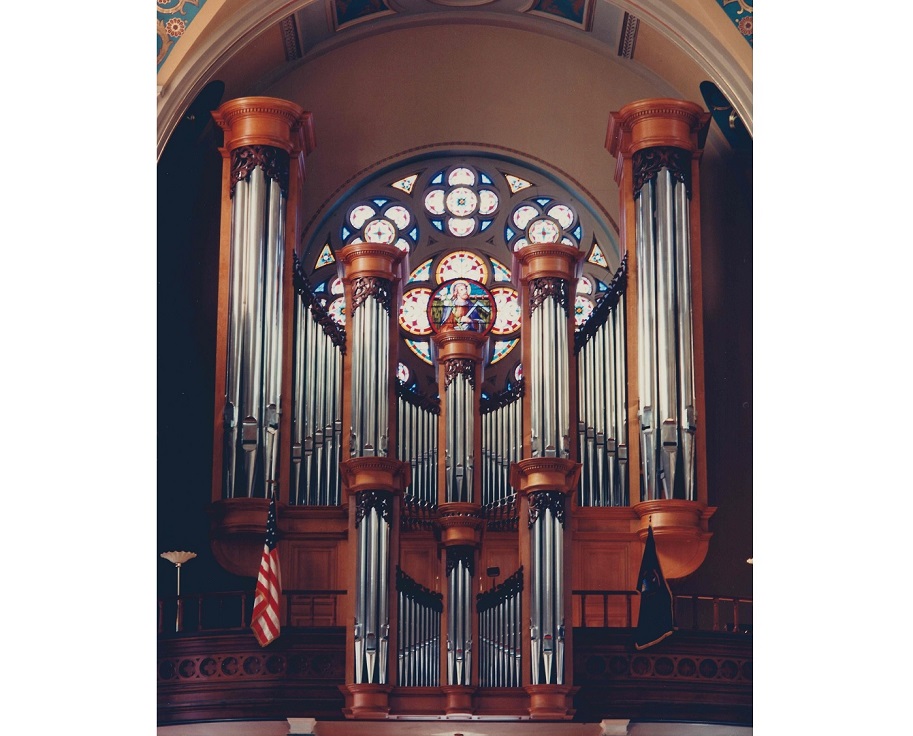Old St. Mary's Roman Catholic Church
Detroit, MI, Opus 12, 1990

Old St. Mary's parish was founded in 1834. The current building
was designed by parishioner Peter Dederichs and completed in 1885.
The previous building's organ was used until it was replaced by an
instrument by Kilgen, of St Louis, MO. This was a large
three-manual, which served well until the 1970s. At that time it
was rebuilt, using what turned out to be an unsuccessful
replacement for traditional pouch leather. The new actions used a
polyurethane membrane, and they began failing within a few short
years. By the time we surveyed the organ in the 1983 or so,
you needed to couple everything together to get most notes
on the Great.
We briefly considered a rebuild using some of the existing
pipework, but it soon appeared that it would be one of those
"oil and water" mixes. We proposed a totally new instrument
with mechanical action, which would guarantee a long life.
The church desired to leave the St. Joseph window at least
somewhat exposed, as the Kilgen façade had done. We
decided that a French-style case with the smallest tower in the
center would frame the window nicely. After an exhaustive study
of French organ cases, especially the late 18th-century cases by
Riepp at Dole and Dijon, we submitted a design that seemed to be
at home in the large Romanesque room.
We modified the gallery rail and built the Positif first, along
with the terraced console. After a year so into the project, the
Positif was already showing itself to be an admirable division
for leading congregational singing, although it was a little
unusual to have as the only pedal stop at that time the 32'
Contre Bourdon!
The main case, which stands 34 feet tall above the gallery floor,
houses the Swell division in the center, flanked by the divided
Great division. Then the divided Pedal division is in the large
outer towers. The tin Trompette en chamade is mounted below the
Swell. The center tower in the main case is exactly the same size
as the outer Positif towers, visually tying the two cases together.
This organ is responsible for our venture into milling our own
lumber. At that time, it was more difficult to find quartersawn
white oak in large matched sizes. This traditional casework with
wide panels made us look into other options for obtaining quality
lumber. We felled all of the trees, and with the use of our
two-man chainsaw mill and portable bandmills, produced all the
lumber for this organ (and several subsequent ones). The beautiful
walnut pipeshades were carved by the Georg Keilhofer studio of
Frankenmuth, Michigan.
The pipework was built to our specifications by shops in Germany
and England. The key action is all mechanical. The stop action for
the Positif is electric, while the stop actions in the main case
are electropneumatic.
STOPLIST Great (58 notes - Manual II) 16' Montre 58 pipes metal 8' Principal 58 pipes metal 8' Flûte Harmonique 46 pipes metal 8' Flûte à Cheminée 58 pipes metal 8' Gambe 58 pipes metal 4' Prestant 58 pipes metal 4' Flûte Conique 58 pipes metal 2-2/3' Quinte 58 pipes metal 2' Doublette 58 pipes metal IV Fourniture (1 1/3') 232 pipes metal III Cymbale (1/2') 174 pipes metal V Cornet 230 pipes metal 16' Bombarde 58 pipes metal 8' Trompette 58 pipes metal 4' Clairon 72 pipes metal Tremulant Positif (58 notes - Manual I) 8' Montre 58 pipes metal 8' Bourdon 58 pipes wood 4' Prestant 58 pipes metal 4' Flûte à Fuseau 58 pipes metal 2' Cor de Chamois 58 pipes metal 1-1/3' Petite Quinte 58 pipes metal IV Cymbale IV (1') 232 pipes metal II Sesquialtera 92 pipes metal 16' Douçaine 58 pipes metal 8' Cromorne 58 pipes metal 8' Trompette en chamade 58 pipes metal Tremulant Swell (58 notes - Manual III) 16' Bourdon 58 pipes Wood 8' Basse 58 pipes Metal 8' Flûte Boucheûe 58 pipes Metal 8' Salicional 58 pipes Metal 8' Viole Céleste (t.c.) 51 pipes Metal 4' Principal 58 pipes Metal 4' Flûte a Chemineûe 58 pipes Metal 2-2/3' Nasard 58 pipes Metal 2' Flûte Sylvestre 58 pipes Metal 1-3/5' Tierce 58 pipes Metal 1-1/3' Larigot 58 pipes Metal V' Plein Jeu (2') 290 pipes Metal 16' Basson 58 pipes Metal 8' Trompette 58 pipes Metal 8' Hautbois 58 pipes Metal 8' Voix Humaine 58 pipes Metal 4' Clairon 70 pipes Metal Tremulant Pedal (30 notes) 32' Contre Bourdon 30 pipes Wood 16' Montre 30 pipes Metal 16' Soubasse 30 pipes Wood 8' Octave 30 pipes Metal 8' Flûte Ouverte 30 pipes Wood 4' Flûte 30 pipes Metal 2-2/3' Fourniture IV (2-2/3') 120 pipes Metal 32' Contre Bombarde 30 pipes Wood 16' Bombarde 30 pipes Wood 8' Trompette 30 pipes Metal 4' Chalumeau 30 pipes Metal Couplers Gt/Ped, Sw/Ped, Pos/Ped Sw/Gt, Pos/Gt, Sw/Pos Reversibles Gt/Ped, Sw/Ped, Pos/Ped, Sw/Gt, Pos/Gt, Sw/Pos Gt reeds, Sw reeds, Pos reeds, Sfz Features Mechanical key action Electropneumatic stop action Curved terraced console Casework of quartersawn white oak Walnut pipeshade carvings by the Georg Keilhofer studio of Frankenmuth, Michigan Totals 54 stops, 74 ranks, 3823 pipes

